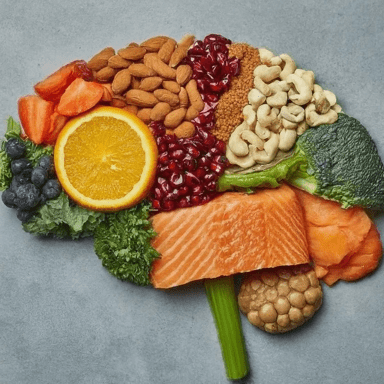
Alzheimer’s disease is a progressive neurodegenerative disorder that affects millions of people worldwide. While no cure exists, emerging research indicates that certain dietary choices may play a role in reducing the risk of developing Alzheimer’s. Recent research suggests that by incorporating specific foods and following particular dietary patterns, you may be able to support brain health and potentially lower your risk of cognitive decline.
If you or a loved one has been diagnosed with Alzheimer’s disease or dementia and need help with daily care including cooking, cleaning, medication reminders, companionship, etc., Homewatch CareGivers of Crystal Lake is here to help. For more information about our services, please contact us via our website or just give us a call (815)-310-1369 today!
The Mediterranean Diet
The Mediterranean diet is widely recognized for its heart and overall health benefits, but many people are not aware of recent research supporting its powerful potential to help protecting brain health. This diet emphasizes whole foods such as fruits, vegetables, whole grains, nuts, seeds, and healthy fats, primarily from olive oil. Fish rich in omega-3 fatty acids, like salmon and mackerel, are also key components.
A 2023 study published in Frontiers in Nueroscience found that adherence to the Mediterranean diet is associated with a reduced risk of Alzheimer’s disease and cognitive decline. The diet’s focus on anti-inflammatory foods and healthy fats is believed to support brain health by mitigating oxidative stress and inflammation, both of which are linked to neurodegeneration.
Click here to learn more about the Mediterranean diet.
The DASH Diet
The Dietary Approaches to Stop Hypertension (DASH) diet was originally created to lower blood pressure, but it has also been found to benefit cognitive health. The DASH diet emphasizes fruits, vegetables, whole grains, lean proteins, and low-fat dairy while limiting saturated fats, sodium, and sugars.
A 2023 study published in Neurology suggests that the DASH diet may help reduce the risk of Alzheimer’s by improving cardiovascular health, which is closely linked to brain health. Maintaining healthy blood pressure and cholesterol levels is critical, as cardiovascular problems are known risk factors for cognitive decline.
Click here to learn more about the DASH diet.
The MIND Diet
The MIND diet, which stands for Mediterranean-DASH Intervention for Neurodegenerative Delay, is a combination of the Mediterranean and DASH diets specifically designed to reduce the risk of Alzheimer’s disease. The MIND diet highlights ten brain-healthy food groups: leafy green vegetables, other vegetables, nuts, berries (especially blueberries), beans, whole grains, fish, poultry, olive oil, and moderate wine consumption.
A study published by the T. H. Chan School of Public Health at Harvard University found that individuals who closely follow the MIND diet may reduce their risk of developing Alzheimer’s disease by up to 53%. The diet also advises limiting red meat, butter, cheese, sweets, and fried foods, which have been linked to cognitive decline.
Click here to learn more about the MIND diet.
Foods Rich in Antioxidants
Antioxidants are essential for protecting the brain from oxidative stress, a key factor in the development of Alzheimer’s disease. Foods rich in antioxidants, such as berries, dark leafy greens, and nuts, are crucial for maintaining cognitive health.
Berries, particularly blueberries, are rich in flavonoids, which have been shown to improve brain function and delay cognitive decline, according to a 2021 research article published in the Neurology. Leafy greens like spinach and kale are packed with vitamins and minerals that support brain health. Nuts, especially walnuts, contain healthy fats and antioxidants beneficial for cognitive function.
Click here to learn more about the role of flavonoids in Alzheimer’s prevention.
Omega-3 Fatty Acids
Omega-3 fatty acids are essential for brain health and are found in fatty fish like salmon, mackerel, and sardines, as well as in flaxseeds, chia seeds, and walnuts. These fats have anti-inflammatory properties and are known to improve brain function, memory, and mood.
A study in the medical journal, Prostaglandins Leukot Essent Fatty Acids indicates that higher intake of omega-3 fatty acids is linked to a reduced risk of Alzheimer’s disease. Incorporating these healthy fats into your diet may help protect your brain and lower the risk of cognitive decline.
Click here to learn more about Omega-3 fatty acids and cognitive health.
While no diet can guarantee the prevention of Alzheimer’s disease, adopting brain-healthy eating habits can significantly reduce your risk. The Mediterranean, DASH, and MIND diets, rich in whole foods, healthy fats, and antioxidants, are all effective in supporting cognitive health. By including foods rich in antioxidants and omega-3 fatty acids in your diet, you can take proactive steps to protect your brain from the effects of aging and inflammation, potentially lowering your risk of Alzheimer’s disease.
Our caregivers and staff at Homewatch CareGivers of Crystal Lake regularly help our clients to prepare healthy foods that align with any nutritional diet. Whether it is one hour a week, 24/7, or anything in-between, we are ready to help you or your loved one maintain a healthy, independent lifestyle. To learn more about our services, visit our webpage, or call us 815-310-1369 today!
---
References:
- Xu Lou I, Ali K and Chen Q, (2023)“Effect of nutrition in Alzheimer’s disease: A systematic review.” Frontiers in Neuroscience. 17:1147177. doi: 10.3389/fnins.2023.11471772.
- Puja Agarwal, Sue E. Leurgans, Sonal Agrawal, Neelum T. Aggarwal, Laurel J. Cherian, Bryan D. James, Klodian Dhana, Lisa L. Barnes, David A. Bennett, and Julie A. Schneider, (2023) "Association of Mediterranean-DASH Intervention for Neurodegenerative Delay and Mediterranean Diets With Alzheimer Disease Pathology." Neurology. 100 (22) https://doi.org/10.1212/WNL.000000000020717
- 3. Harvard T. H. Chan School of Public Health, (2023) “Diet Review: MIND Diet.” The Nutrition Source. https://nutritionsource.hsph.harvard.edu/healthy-weight/diet-reviews/mind-diet/
- 4. Tian-Shin Yeh, Changzheng Yuan, Alberto Ascherio, Bernard A. Rosner, Walter C. Willett, and Deborah Blacker. (2021) “Long-term Dietary Flavonoid Intake and Subjective Cognitive Decline in US Men and Women.” Neurology. 97 (10) https://doi.org/10.1212/WNL.0000000000012454
- 5. Cole GM, Ma QL, Frautschy SA. (2009)“Omega-3 fatty acids and dementia.” Prostaglandins Leukot Essent Fatty Acids. 81(2-3):213-21. doi: 10.1016

